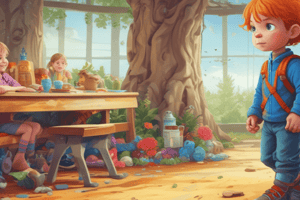Podcast
Questions and Answers
The child develops a feeling of trust in his or her caregivers.
The child develops a feeling of trust in his or her caregivers.
Oral-sensory
The child learns what he or she can and cannot control and develops a
sense of free will.
The child learns what he or she can and cannot control and develops a sense of free will.
Muscular-anal
The child learns to become independent by exploring, manipulating, and
taking action.
The child learns to become independent by exploring, manipulating, and taking action.
Locomotor
The child learns to do things well or correctly according to standards set
by others, particularly in school.
The child learns to do things well or correctly according to standards set by others, particularly in school.
The adolescent develops a well-defined and positive sense of self in
relationship to others.
The adolescent develops a well-defined and positive sense of self in relationship to others.
The person develops the ability to give and receive love and to make
long-term commitments.
The person develops the ability to give and receive love and to make long-term commitments.
The person develops acceptance of his or her life as it was lived.
The person develops acceptance of his or her life as it was lived.
The person develops an interest in guiding the development of the next
generation, often by becoming a parent.
The person develops an interest in guiding the development of the next generation, often by becoming a parent.
What are the 8 stages
What are the 8 stages
ENUMERATE THE KEY CHALLENGE
ENUMERATE THE KEY CHALLENGE
Flashcards are hidden until you start studying
Study Notes
Stages of Development
- Trust vs. Mistrust: The child develops a feeling of trust in their caregivers.
- Autonomy vs. Shame and Doubt: The child learns what they can and cannot control and develops a sense of free will.
- Initiative vs. Guilt: The child learns to become independent by exploring, manipulating, and taking action.
- Industry vs. Inferiority: The child learns to do things well or correctly according to standards set by others, particularly in school.
- Identity vs. Role Confusion: The adolescent develops a well-defined and positive sense of self in relationship to others.
- Intimacy vs. Isolation: The person develops the ability to give and receive love and to make long-term commitments.
- Generativity vs. Stagnation: The person develops an interest in guiding the development of the next generation, often by becoming a parent.
- Integrity vs. Despair: The person develops acceptance of their life as it was lived.
Key Challenges
- Developing trust in caregivers
- Balancing autonomy with shame and doubt
- Taking initiative without feeling guilty
- Meeting standards set by others
- Establishing a positive sense of self
- Forming intimate relationships
- Guiding the next generation
- Accepting one's life as it was lived
Studying That Suits You
Use AI to generate personalized quizzes and flashcards to suit your learning preferences.



